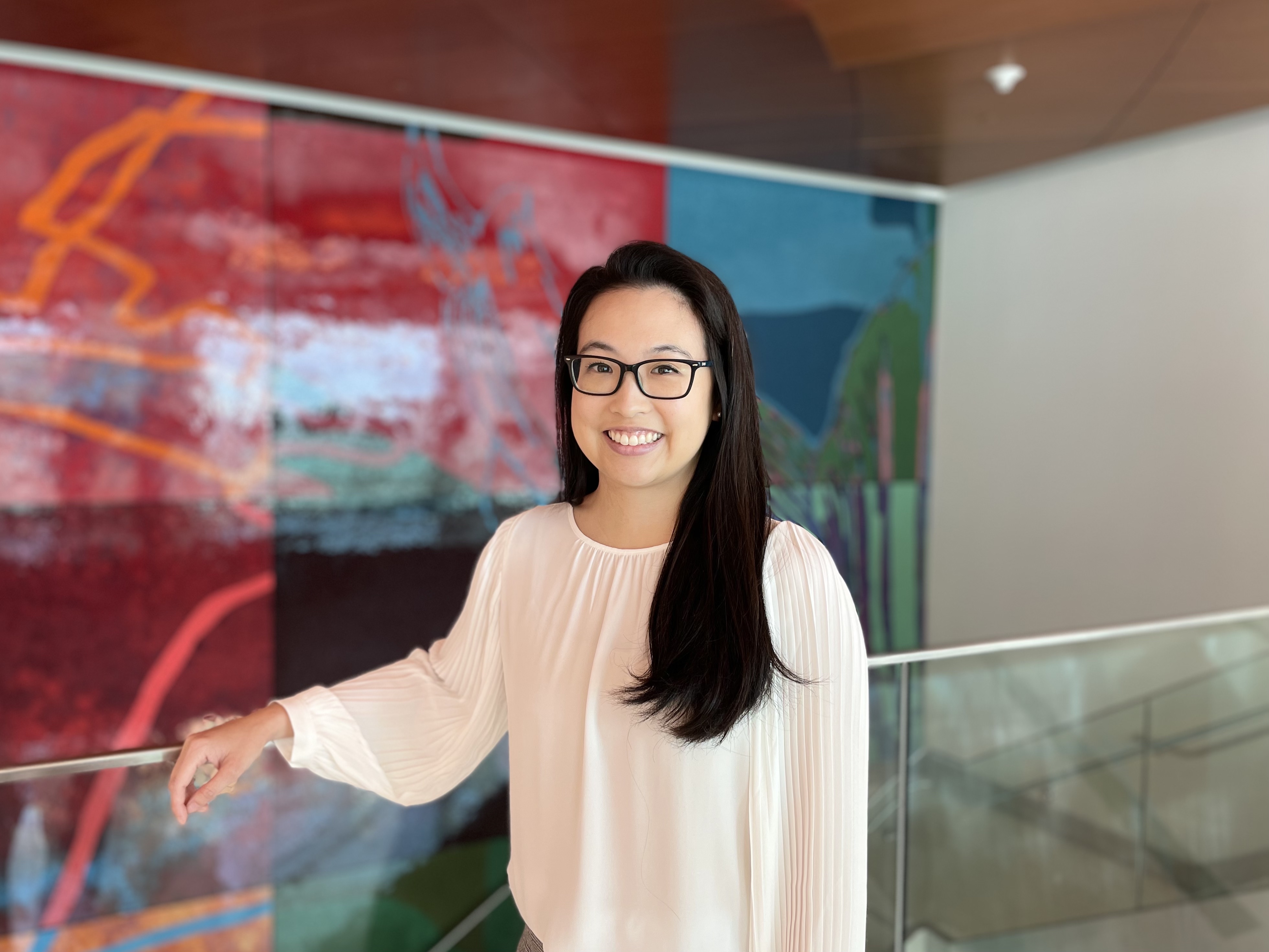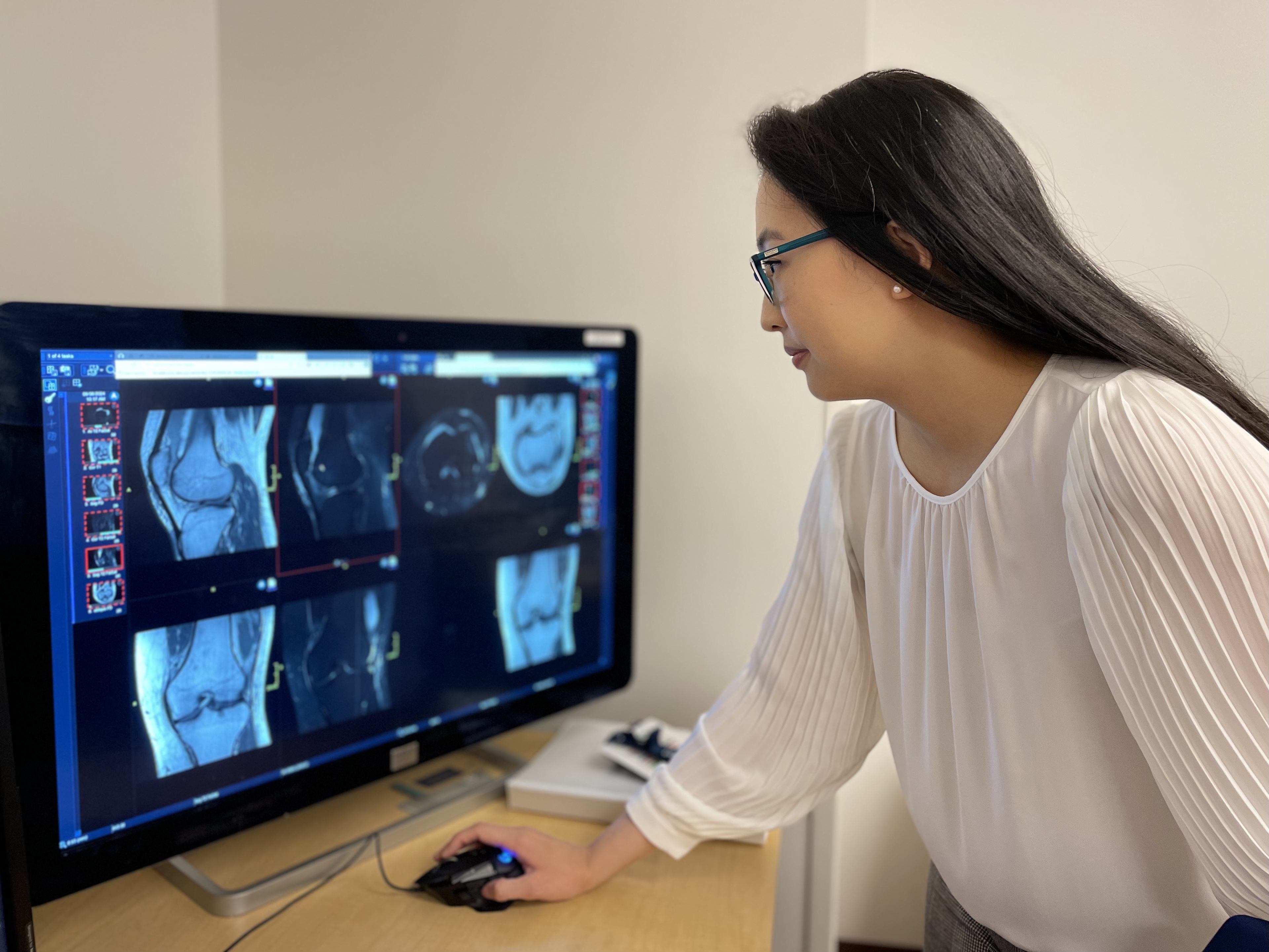Women in Medicine Month: Celebrating Women Advancing Radiology
During Women in Medicine Month we’re proud to honor the clinicians, researchers, and educators who are advancing radiology. From exceptional patient care to teaching and discovery, we’re spotlighting the significant contributions of women at UCSF Radiology & Biomedical Imaging and sharing their experiences, reflections, and insights as women in medicine. This story is part 1 of our Women in Medicine Month series.
Leading the Future with Imaging Informatics
With a passion for radiology sparked when she shadowed a radiologist in medical school, Hailey Choi, MD, recalls that her first time observing a reading room “wasn’t the most glamorous and not what you imagine as a doctor when you're a student. I just remember thinking, ‘This is so cool!’”
Today, Choi is an associate professor in the Abdominal Imaging division. In July, she was appointed Medical Director for Apex Imaging Informatics, a new leadership position within UCSF Health that draws on her deep and broad experience with major healthcare information systems such as APeX and PACS. As medical director, Choi co-chairs the Radiology APeX Clinical Content Committee (RAC3) and is focused on establishing and maintaining consistent workflows across enterprise imaging at UCSF. Her role will be critical to UCSF Health’s multidisciplinary effort to optimize patient scheduling, which is underway.
“Radiology is like a mental puzzle,” Choi says. She enjoys connecting the dots from x-ray, CT, MRI, and ultrasound imaging. “I love my subspecialty. My personal joy is finding the connections between the different modalities.”
This disposition – seeing the complex parts of medical imaging as a whole – makes Choi perfectly suited to lead the RAC3 team on their first major project: updating the imaging Procedure Dictionary. The Procedure Dictionary drives how providers order and administrators schedule radiology exams. Over time, as imaging has evolved, this dictionary has become incredibly complex, and the nuances of each imaging exam and protocol are not accurately reflected in the current Procedure Dictionary. The update will allow better communication between the referring provider and radiology team, so that we can deliver the best care for each patient.
With Choi’s leadership, cracking this complex puzzle will improve our ability to schedule every imaging patient the right way, the first time.
This is an ambitious and achievable goal, and reflecting on her career, Choi credits her success in part to the women radiologists – she lovingly calls them radiology moms – who serve as her mentors. “They have always had my best interests at heart.”
In Abdominal Imaging, Choi appreciates that many women hold leadership roles. She’s developed strong connections with her colleagues and often seeks their advice. During her training and early in her faculty role, Choi notes that her mentors were instrumental in demonstrating how to carry oneself with confidence and speak with authority and certainty.
For women considering a career in medicine, Choi advises, “Do what you love. Listen to your heart. Get insight into what drives you. Know what your day is going to look like. Know yourself better to hopefully make better, more long lasting, and gratifying choices.”
Pioneering Advances in Alzheimer’s Research
 Professor and scientist skilled in biomarker discovery, Duygu Tosun-Turgut, PhD, is building research programs and teams that leverage informatics and medicine to answer clinically impactful questions and accelerate clinical trials of Alzheimer's and other neurodegenerative diseases. She is the founding director of Medical Imaging Informatics and Artificial Intelligence at the San Francisco Veterans Affairs Medical Center. In 2022, she was named a Distinguished Investigator by the Academy for Radiology & Biomedical Imaging Research.
Professor and scientist skilled in biomarker discovery, Duygu Tosun-Turgut, PhD, is building research programs and teams that leverage informatics and medicine to answer clinically impactful questions and accelerate clinical trials of Alzheimer's and other neurodegenerative diseases. She is the founding director of Medical Imaging Informatics and Artificial Intelligence at the San Francisco Veterans Affairs Medical Center. In 2022, she was named a Distinguished Investigator by the Academy for Radiology & Biomedical Imaging Research.
“My comfort zone was always physics and math,” she says. Born and raised in Turkey, she grew up in a culture that encouraged girls to excel in math and science. She obtained her degree in Electrical and Electronic Engineering from Bilkent University in Turkey. Then she came to the United States to attend Johns Hopkins University, where she earned a PhD in Electrical and Computer Engineering, followed by a postdoctoral fellowship in neurology from the University of California, Los Angeles.
“It's still tough to be a woman in science,” she says, acknowledging she’s felt the need to prove herself at times. “You need to believe that you are good and really understand the value you're bringing to the table.”
She’s an award-winning principal investigator on many research projects, a recipient of many prestigious grants, and the author of numerous research papers. And yet, what she’s most proud of are the relationships she’s built along the way. The respect, trust, and strong connections with colleagues are what she finds most rewarding.
At UCSF and beyond, Tosun-Turgut strives to create a supportive environment for women in research. She’s currently the Chair of the Alzheimer Association’s Alliance for Women in Alzheimer Research. In this role, she strives to create opportunities for women to connect in a safe environment to share experiences and freely discuss their thoughts.
“It provides a stronger voice for everyone, knowing you're not alone, and learning from others about how they are handling and solving similar problems,” she says.
In her role at UCSF, she prioritizes the success of her trainees by creating opportunities for their growth and achievement within a network of support, knowing they will advance their careers and continue to make a positive impact in neurodegenerative disease research and discovery in the future.
“Girls and women are capable of anything,” she says, reflecting on her career and family life. As a mother who effectively balances the demands of both career and family daily, she offers everyone the same advice she gives to her 14-year-old son and a 10-year-old daughter:
“You can be anything and everything you want. Do what makes you feel content, happy, and complete.”
Caring for Underserved Patients

As early as she can remember, Ellen Chang, MD, dreamed of being a doctor to help other people. From the musculoskeletal reading room in Building 25 at Zuckerberg San Francisco General Hospital, she shares how meaningful it is to come to work every day and make a difference in the lives of patients young and old, affected by a myriad of pathologies and musculoskeletal conditions. Chang knows that many ZSFG patients might otherwise slip through the cracks of the healthcare system if not for the services provided at the county hospital.
“Everyone deserves the same level of care, regardless of background,” she says. “I look forward to going to work every day.”
Working across MRI, CT, radiography, and ultrasound imaging, Chang finds diagnostic musculoskeletal imaging interesting and intellectually satisfying, especially the subtle findings. Because musculoskeletal conditions can severely impact a person’s mobility and function, an accurate diagnosis via imaging is often the first step in establishing a patient’s treatment plan. Chang also has interest in musculoskeletal interventional procedures such as steroid joint injections to alleviate pain and image-guided biopsies, and her research explores image-guided interventions, trauma, and trainee education projects.
A native of the Bay Area, Chang jumped at the opportunity to return to UCSF and ZSFG as an assistant professor nearly two years ago. After completing a diagnostic radiology residency with a neuroradiology concentration at Dartmouth Hitchcock Medical Center, followed by a musculoskeletal fellowship at Mallinckrodt Institute of Radiology, she longed to return to San Francisco to be close to her family. At ZSFG, she immediately knew she made the right choice.
“In medicine in general and throughout my experience in radiology, it’s been wonderful to see so much representation of women and women in leadership roles,” she says. Proud to be a role model for residents, Chang remarks, “Though I’m early in my career, being a great example of what’s possible for trainees gives me extra motivation.”
When asked what she enjoys most about her role, Chang is quick to name collaborative work in an academic environment.
“I love teaching. Being at UCSF and ZSFG gives me the opportunity to teach during read-out and also give dedicated resident lectures,” she says.

Chang also collaborates with ordering physicians who visit the reading room to discuss imaging studies, finding that these provider conferences are a great opportunity to communicate directly about what the images show.
“It’s wonderful because it’s a very collaborative environment. We get to interact with other teams in the hospital. They provide feedback on a patient’s whole clinical picture. In turn, our colleagues can see what we’re seeing from the perspective of imaging,” she says.
Outside of the hospital, Chang loves to read and create – she enjoys all types of crochet, paper, and clay crafts. She also enjoys snapping amateur photography of her travels.
With energy and excitement, she passes on her words of advice to other women considering a career in radiology:
“Try not to compare yourself to others,” she says. “Everyone has their own path, and the way that they get to medicine and through medicine is often very different. Try to do your best for yourself.”
